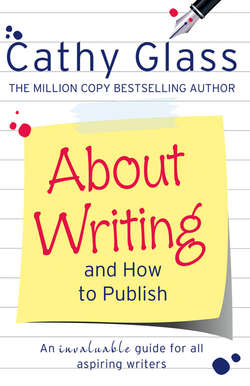Читать книгу About Writing and How to Publish - Cathy Glass, Cathy Glass - Страница 12
Оглавление
I am not going to spend time writing a tome about spelling, punctuation and grammar. This book is not big enough for that and there are thousands of very good books on the subject already, as well as websites that give online advice and tutorials. In the UK, teaching grammar in schools went out of vogue for a whole generation as it was felt it stifled creativity. But, as with many trends in education, attitudes have come full circle and grammar is now being taught in schools again.
Don’t worry if you missed out; you don’t need to know that you are writing in prose, as long as you are, or that an independent clause must contain a subject and predicate, as long as it does. If you read extensively you will absorb good grammar and sentence structure through example. But if you feel your written English isn’t up to the task of writing your story and you seriously want to write, then you will need to set about improving your core skills, as you would before undertaking any new task. All colleges of further education offer day and evening classes in English language, as do distance-learning courses (for example, the Open University). You don’t have to wait until you’ve finished the course to begin writing; you can hone your skills while you are writing your story.
Reading
I can’t emphasize enough the importance of reading, especially the genre in which you wish to write. Not only will reading improve your sentence structure, vocabulary, spelling and language skills, it will also show you what makes a good book – its structure, layout and pacing. If you find a word you don’t know the meaning of while you’re reading then look it up in a dictionary or online. I also suggest you make a note of any interesting or unusual words or phrases you come across to improve the richness of your vocabulary. I love words, so I have a small notepad in which I make a note of any new words or phrases I come across that appeal to me. I’ve had the same notebook for over twenty-five years and some of the early jottings include: ‘diversely opposed’, ‘pragmatism’, ‘a sense of entitlement’ and ‘youthful remembrance’. I may use a variation of these one day, so I keep my little book as an aide-mémoire. Now there’s a neat phrase. If you don’t know the meaning of aide-mémoire then look it up.
Spellchecker
Now a word about computer ‘spellcheckers’. Most computer software includes spelling and grammar checkers. Use them, but with caution. While they are usually good for picking up basic errors (silly spelling mistakes, typing errors, extra spaces, omissions of capital letters, etc.), they are far from foolproof and often make errors of judgement far worse than your own. Here are some examples taken from the first fifty pages of my book Damaged:
‘One of the couples were first-time carers and Jodie should never have been placed with them.’ The spellchecker, not recognizing that in this context the verb needs to be in the plural, not the singular, highlighted were as being incorrect and suggested was as the replacement.
‘Look who’s come to see you, Jodie!’ The spellchecker suggested whose, which is an entirely different word. Who’s is the shortened form of who is or who has, while whose is the possessive form of who.
‘The sound of Jodie talking to herself floated down …’ The spellchecker wanted to use her instead of the reflexive pronoun herself.
‘She dropped to her knees and started thumping her face and head viciously.’ The spellchecker wanted to replace face with the plural faces.
Here are some further examples from my book Another Forgotten Child:
‘I was grateful my children were so understanding …’ The spellchecker, unable to recognize the past continuous verb tense, wanted to replace so understanding with understood.
‘“Come on, dry yourself,” I encouraged.’ The spellchecker, unable to see that yourself was being used as a reflexive pronoun, wanted to replace it with you.
You don’t have to know the grammatical terms, just that what you have written sounds grammatically correct while the spellchecker’s suggestion sounds wrong. English is a very rich language and one of the upshots of this is that the same word or phrase can be used differently or have a nuanced meaning depending on its context. Computers are clever, but not so clever (yet) as to be able to recognize these subtle variations in language, so it highlights your word or phrase as being incorrect and then suggests an alternative based on a literal interpretation. If you have doubts about the accuracy of your spellchecker’s suggestion then err on the side of caution and don’t accept a suggested replacement until you have checked your word or phrase on one of the many English grammar websites or in a grammar book.
